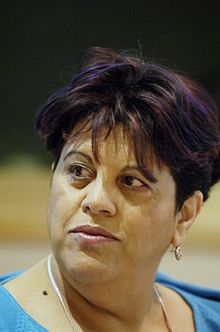Nabila Espanioly
Nabila Espanioly | |
|---|---|
 | |
| Born | 1954/1955 (age 65–66) |
| Nationality | Palestinian-Israeli |
| Occupation | Clinical psychologist, Social worker |
| Organization | Al-Tufula Center |
Nabila Espanioly is a Palestinian-Israeli psychologist, social worker, feminist, and peace activist. She is the founder and director of the Al-Tufula Center in Nazareth.
Early life and education[]
Espanioly grew up in a communist family in Nazareth, and was involved in the Nazareth branch of the beginning as a child.[1]
Espanioly received a B.A. in Social Work from the University of Haifa, and an M.A. in Psychology from the University of Bamberg.[2][3]
Career[]
Political activity[]
Espanioly became active in the Israeli women’s movement during the First Intifada.[4] As a member of the and a well-known Palestinian-Israeli feminist, she appeared regularly on Israeli national news programs. She advocated for the formation of groups for Palestinian women within larger Israeli women's organizations, notably supporting the concept at Israeli feminist conferences in 1994 and 1995,[5] while also emphasizing her view that women are "united by [their] oppression."[6]
After the 2008-2009 Gaza War, Espanioly participated in protests led by the Israeli Communist Party and by pacifists, and worked with local women's cells of the Party to organize humanitarian aid for the Palestinians in the Gaza Strip.[7]
Espanioly ran an unsuccessful campaign for the Knesset as a member of Hadash in 2013.[8][9] She was also involved in the founding of the Mossawa Center, which later[when?] presented her an award for her activism.[10]
Al-Tufula Center[]
Espanioly is the founder and director of the Al-Tufula Center in Nazareth,[11][12] which works to support early childhood education for Palestinian families.[13] She founded the Center in the late 1980s.[1]
References[]
- ^ Jump up to: a b Marteu 2010, p. 51.
- ^ "Discrimination, Police Brutality, and Racism: The Struggle of Arab Palestinians in Israel". The Jerusalem Fund. Retrieved 2021-01-23.
- ^ "Café Palestine Seven: Violence against Palestinian Women: an intersectional struggle". Palestine-Global Mental Health Network. Retrieved 2021-01-23.
- ^ White 2013, p. 127.
- ^ White 2013, p. 129.
- ^ White 2013, p. 133.
- ^ Marteu 2010, p. 54.
- ^ Molavi, Shourideh C. (2013-06-28). Stateless Citizenship: The Palestinian-Arab Citizens of Israel. BRILL. p. 64. ISBN 978-90-04-25407-7.
- ^ "My takeaway from J Street". Partners For Progressive Israel. Retrieved 2021-01-23.
- ^ "MLK III will present awards to the unrecognized village of Al-Araqib and two Arab human rights activists - مركز مساواة لحقوق المواطنين العرب في اسرائيل". Mossawa Center. Retrieved 2021-01-23.
- ^ Khoury, Jack (2011-10-03). "Nazareth activist honored by global women's group". Haaretz.com. Retrieved 2021-01-23.
- ^ "Second Class: Discrimination Against Palestinian Arab Children in Israel's Schools - Kindergartens". Human Rights Watch. September 2001. Retrieved 2021-01-23.
- ^ Shupac, Jodie (2016-10-07). "Nabila Espanioly: advocating for Arab Israeli women". The Canadian Jewish News. Retrieved 2021-01-23.
Bibliography[]
- Marteu, Elisabeth (2010). "Compléments ou alternatives? Associations de femmes et partis politiques arabes palestiniens en Israël" [Complements or alternatives? Palestinian Arab Women's Associations and Political Parties in Israel]. Le Mouvement Social (in French). 231 (1): 45–62. doi:10.1353/lms.0.0127. ISSN 1961-8646. S2CID 144497905 – via Project MUSE.
- White, Adam (2013). The Everyday Life of the State: A State-in-Society Approach. Seattle: University of Washington Press. ISBN 978-0-295-80463-7 – via Project MUSE.
External links[]
- Clinical psychologists
- Israeli social workers
- Hadash politicians
- University of Haifa alumni
- University of Bamberg alumni
- Living people
- Palestinian communists
- Israeli communists
- Palestinian feminists
- Israeli feminists